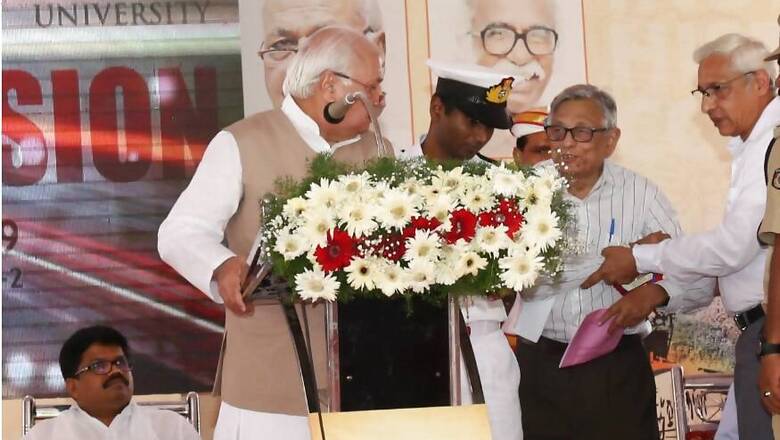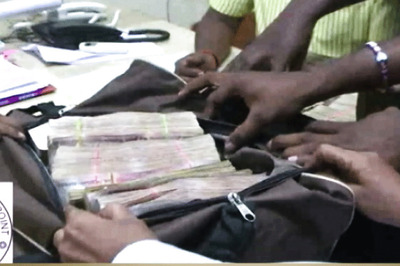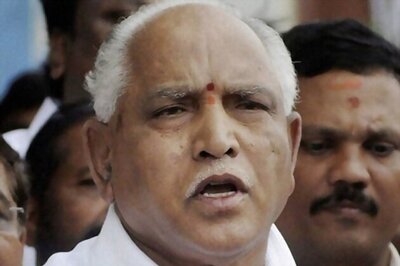
views
New Delhi: Kerala Governor Arif Mohammed Khan faced unprecedented protests on Saturday from some delegates, including noted historian Irfan Habib, during his speech at the Indian History Congress (IHC) in Kannur.
The incident occurred at Kannur University where the governor was inaugurating the 80th session of the IHC and responding to questions on the amended Citizenship Act and Kashmir.
Habib and some other delegates protested after the governor started quoting Maulana Azad while speaking on the issue. Khan said Habib got up from his seat and tried to stop him from addressing the issue. The historian also asked him to quote Mahatma Gandhi's assassin Nathuram Godse instead of leaders like Azad or Gandhi.
"You have every right to protest. But you cannot shout me down", Khan said repeatedly as some of the delegates, sitting in front, protested inside the auditorium. "When you shut the door for debate and discussion, you are promoting violence," he added.
The governor told News18, "I was only responding to points raised by Habib and as the governor, I am duty-bound to protect the Constitution. But he tried to disrupt my speech."
He also put out a series of tweets condemning the incident. "Trying to disrupt speech from stage and audience due to intolerance towards different opinion is undemocratic," he said while referring to the protests.
Inaugural meet of Indian History Congress does not raise controversies. But at 80th session at Kannur university, Shri Irfan Habib raised some points on CAA. But, when Hon'ble Governor addressed these points, Sh.Habib rose from seat to physically stop him, as clear from video pic.twitter.com/mZrlUTpONn— Kerala Governor (@KeralaGovernor) December 28, 2019
Shri #IrfanHabib tried on stage to disrupt inaugural address questioning Hon'ble Governor's right to quote #MaulanaAbdulKalamAzad, shouting that he should quote Godse.He pushed Hon'ble Governor's ADC&SecurityOfficer, who prevented his unseemly gesture #IndianHistoryCongress pic.twitter.com/P7hA2HZQg8— Kerala Governor (@KeralaGovernor) December 28, 2019
Hon'ble Governor said that he had responded to points raised by previous speakers,as a person duty bound to defend &protect the Constitution.But trying to disrupt speech from stage&audience due to intolerance towards different opinion is undemocratic #IndianHistoryCongress pic.twitter.com/UDCElnui7I— Kerala Governor (@KeralaGovernor) December 28, 2019
Holding placards, some students from universities outside the state were seen raising slogans and were removed by police. The IHC secretary said, "Some the delegates were peacefully standing and holding placards. They were roughed up by police".
The governor said, "Had these issues (of Citizenship Act, Kashmir) not been raised here, I would not have said all this. I would have stuck to my prepared speech."
Some delegates shouted "Kerala Governor shame shame" as Khan concluded his speech. A woman delegate, who was taken away in a police jeep alleged the personnel were pushing them. This is not right, she said.
Another delegate said the governor was quoting Maulana Azad, Gandhi and others without any context.
CPI(M) MP KK Ragesh said, "The governor was speaking like an RSS person and started the speech by addressing it to me, saying, 'Mr MP, this is for you'. Habib did not push anyone. When the governor misquoted Azad, Habib said it's better to quote Godse. The delegates started protesting when the governor was misquoting Azad."
Aligarh Muslim University professor Shireen Moosvi, who was present at the event said, "Khan was talking nonsense. Habib stopped him saying why are you quoting Azad and Gandhi. Quote Godse." Moosvi is a member of the IHC.
During a recent interview, Habib had said it would be wrong to look upon the recent outburst of public sentiments against the Citizenship (Amendment) Act as merely a "Muslim outrage" as it would ultimately impact all and the "idea of India as a modern state".
According to the new Act, members of Hindu, Sikh, Buddhist, Jain, Parsi and Christian communities, who have come from Pakistan, Bangladesh and Afghanistan till December 31, 2014, and facing religious persecution there, would not be treated as illegal immigrants but given Indian citizenship.
The Act said refugees of the six communities would be given Indian citizenship after residing in India for five years, instead of 11 earlier.
(With inputs from Eram Agha, Neethu Reghukumar and agencies)



















Comments
0 comment